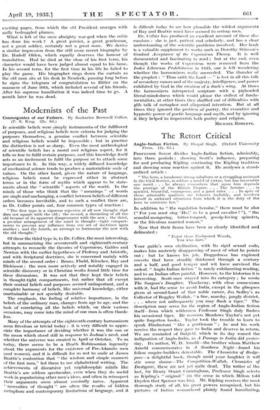Modernists of the Past
Cosmogonies of our Fathers. By Katharine Brownell Collier. (P. S. King. 22s. ad.) IF scientific beliefs were simply instruments-of the fulfilment of purposes, and religious beliefs were criteria for judging the purposes themselves, a genuine conflict between scientific and religious beliefs would he impossible ; but in practice the distinction is not so sharp. Even the most untheological of scientific beliefs has a moral and religious aspect, for it tells us how to fulfil certain purposes, and this knowledge itself acts as an incitement to fulfil the purpose or to attach some importance to it. In this way, a widely diffused knowledge of mechanical science tends to produce a materialistic scale of values. On the other hand, given the nature of language, religious beliefs must be expressed either in abstract terms or in the form of myths which appear to be state- ments about the " scientific " aspects of the world. In the minds of those who think that the meanings " of words are single and unchanging, a conflict between beliefs of different orders becomes inevitable, and to such a conflict there are, as Dr. Collier points out, four common types of reaction : " The first type is a vigorous rejection of all new thought that does not square with the old ; the second, a discarding of all the old because of its apparent disagreement with the new - the third, a peculiar arrangement of the mind in thought—tight compart- ments to prevent any influence from one set of doctrines upon another ; and the fourth, an attempt to harmonize the new with the old thought."
Of these the third type is, to Dr. Collier, the most interesting, but in summarizing the seventeenth and eighteenth-century attempts to reconcile the theories of Copernicus, Galileo and Newton with the earlier hypotheses of Ptolemy and Aristotle, and with Scriptural doctrines, she is concerned mainly with minds of the second order : Bruno, Fludd, Kirscher, Ray and Dickinson : the men more actively and notably engaged in scientific discovery or in Christian works found little time for these discussions. It was not that they kept their beliefs in thought-tight compartments, but rather that all except their central beliefs and purposes seemed unimportant, and a complete harmony of beliefs, like universal knowledge, either Unattainable or not specially desirable.
The emphasis, the feeling of relative importance, in the beliefs of the ordinary man, changes from age to age, and the task of correlating all the beliefs which, on their various occasions, may come into the mind of one man is often thank- less: Many of the attempts of the eighteenth-century harmonizers seem frivolous or trivial today : it is very difficult to appre- ciate the importance of deciding whether it was the sun or the moon which stood still in response to Joshua's need, and whether the universe was created in April or October. To us today, there seems to be a Heath Robinsonian ingenuity
about the arguments for the existence of Pre-Adamite men (and women), and it is difficult for us not to smile at James Beattie's contention that the wisdom and simple manner's of the first men," led them to use alphabetical writing. The achievements of discursive yet ' unphilosophic minds like Beattie's are seldom spectacular, even when they do useful work in popularizing other men's ideas, and often in retrospect their arguments seem almost comically naive. Apparent " necessities of thought" are often the results of hidden metaphors and contemporary limitations of language, and it
is difficult today to see hoW plausible the wildest arguments of Ray and Beattie must have seemed to serious men.
Dr. Collier has produced an excellent account of these dis- cussions : she is just, patient and scholarly, and has a clear understanding of the scientific problems involved. Iler book is a valuable supplement to works such as Dorothy Stimson's Gradual Acceptance of the Copernican Theory. It is well documented and fascinating to read ; but at the end, even though the works of Copernicus were removed from the Index Libroruni Prohibitorum in 1835, one is left wondering whether the harmonizers really succeeded. The thunder of the prophet : " Thus saith the Lord —." is lost in all this talk of secondary causes and of the majesty, intelligence, and power exhibited by God in the creation of a duck's wing. At times the harmonizers interpreted scripture with a pigheaded literal-mindedness which would please the stiffest of funda- mentalists, at other times they shuffled out of difficulties with glib talk of metaphor and allegorical intention. But at all times they ignored the problem of poetry, the evocative and hypnotic power of poetic language and myth, and by ignoring it they helped to impoverish both poetry and religion.
MICHAEL ROBERTS.






































 Previous page
Previous page